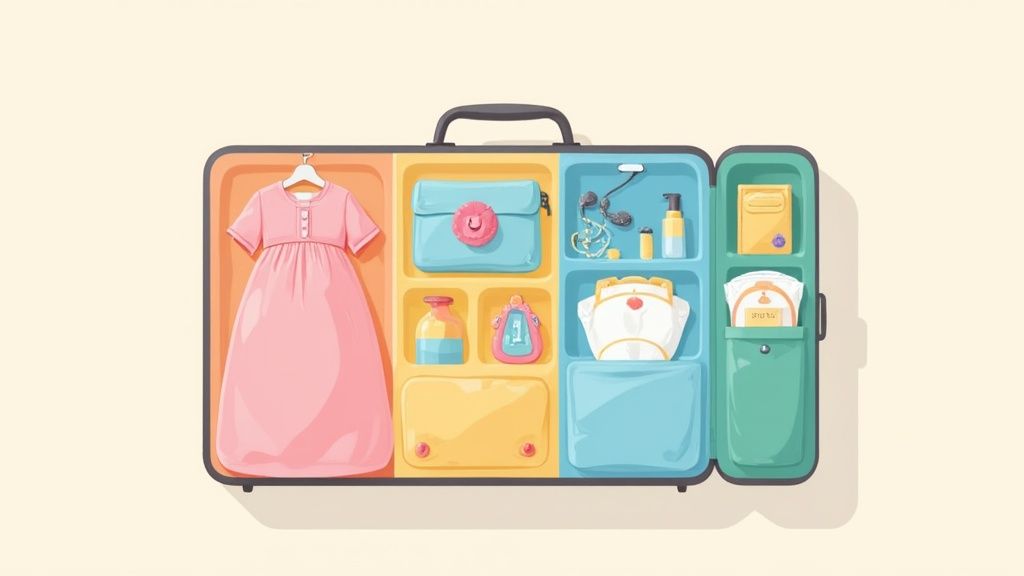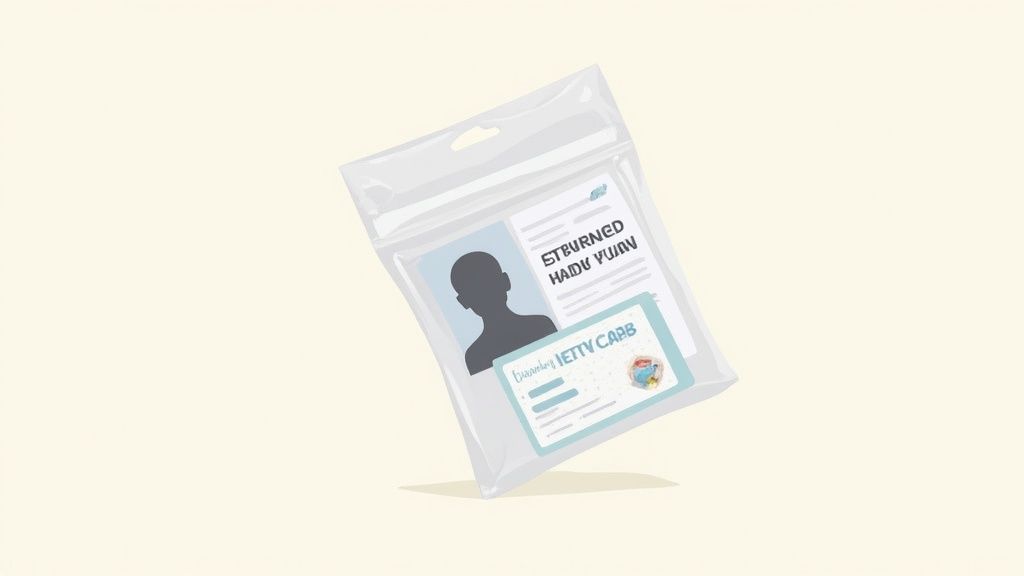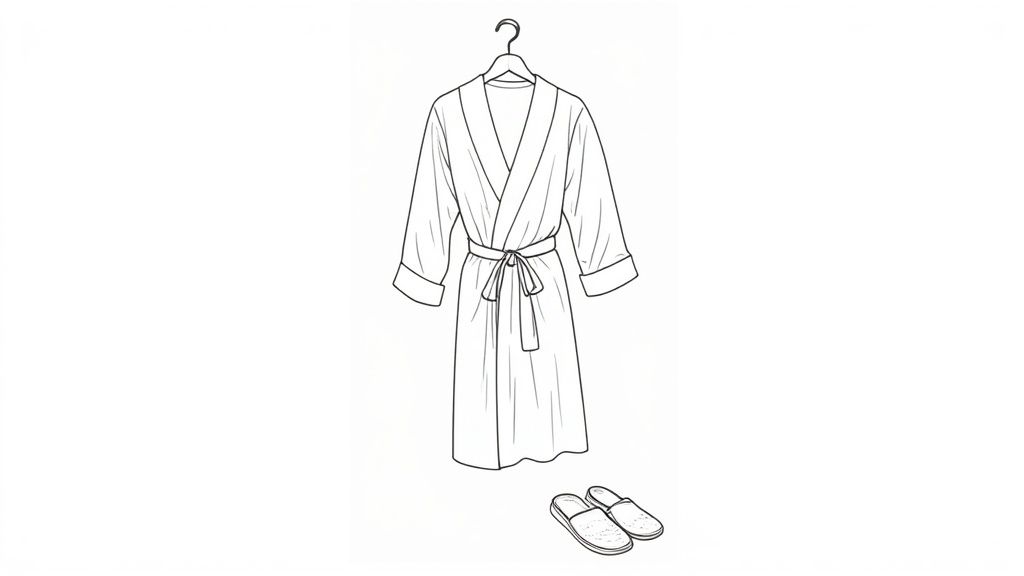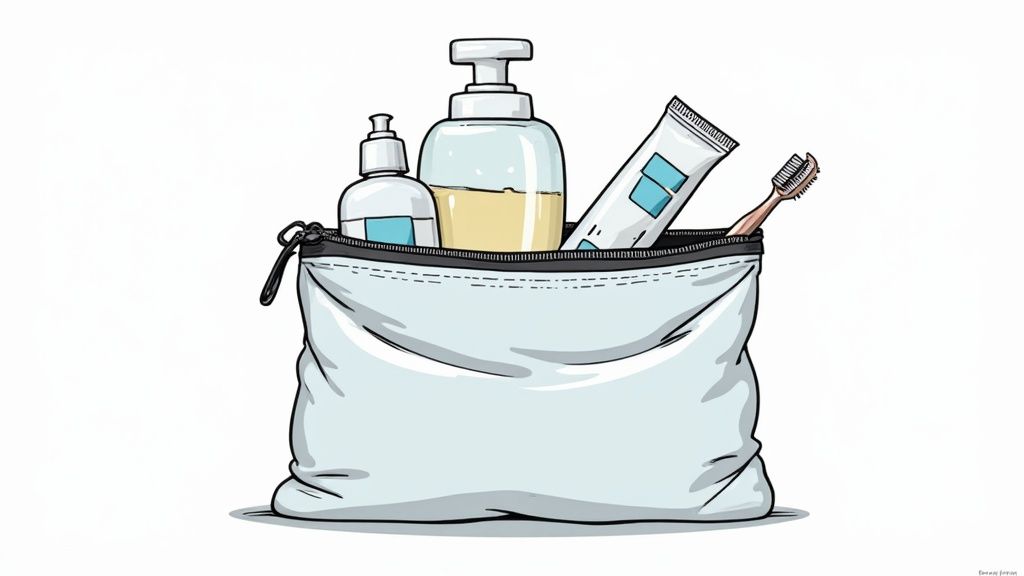
The Ultimate 2025 Checklist: What to Pack Hospital Bag
Share
That moment is almost here! Between finalizing the nursery and daydreaming about tiny toes, the looming question of what to pack in your hospital bag can feel like one last-minute mountain to climb. It’s easy to get lost in a sea of suggestions, wondering what’s truly necessary versus what’s just extra weight to carry.
Fear not, we’re here to swap that packing stress for serene preparedness. This isn't just another generic list; it's your ultimate, no-fluff, comprehensive guide. We’ve meticulously broken down every essential, from the absolute must-have documents to the game-changing comfort items you’ll be so grateful you remembered. We’ll cover everything for mom, baby, and your support person, ensuring everyone feels comfortable and ready.
Think of this as your calm and collected roadmap to a smoother, more comfortable hospital stay. By having your bag packed and ready to go, you can shift your focus entirely to what truly matters: the incredible experience of welcoming your new little one into the world. You've got this, and we've got your packing list covered. Let’s dive in and get that bag ready for action.
1. Essential Personal Documents and Insurance Cards
Alright, let's start with the boring but absolutely non-negotiable stuff. Tossing your favorite slippers into your hospital bag is fun, but forgetting your paperwork can turn your smooth check-in into a frantic scavenger hunt. Think of this as your "get in the door" kit; having these documents organized and ready will eliminate a massive headache, letting you focus on what really matters. A little prep work here goes a long way.

This step is critical because it directly impacts the speed of your admission and the accuracy of your medical care and billing. When you arrive, especially if it's an emergency, the staff needs to quickly verify who you are, what medical coverage you have, and if you have any specific medical directives.
What to Bring and Why
Here’s a breakdown of the must-have documents to pack in your hospital bag:
- Photo ID: A driver's license or other government-issued photo ID is essential for verifying your identity.
- Insurance Cards: Bring cards for both primary and secondary coverage. This ensures the hospital has all the information needed for billing, which saves you from a tangled mess of paperwork later on.
- Birth Plan (if applicable): If you've created a birth plan, bring a few copies. Give one to the admissions desk, one to your labor and delivery nurse, and keep one for yourself. This ensures your preferences regarding pain management, labor positions, and newborn procedures are clearly communicated.
- Hospital Pre-Registration Forms: Many hospitals allow you to pre-register online. If you filled out any paperwork ahead of time, bring your confirmation or copies of the forms with you.
- List of Important Contacts: While you likely have these in your phone, a physical list with names and numbers for family, your pediatrician, and anyone else who needs to be notified is a great backup.
Pro Tip: Keep all these documents together in a waterproof folder or a large, clear zip-top bag. This keeps them protected from accidental spills and makes them easy to find in a hurry.
By gathering these items beforehand, you’re not just packing a bag; you're setting the stage for a calmer, more organized hospital experience.
2. Comfortable Sleepwear and Robes
Let’s be honest, those standard-issue hospital gowns are not known for their comfort, coverage, or style. Packing your own sleepwear and a cozy robe is one of the best ways to bring a piece of home with you, helping you feel more human and relaxed during your stay. Think of this as your personal comfort armor; it’s about maintaining your dignity and sense of self in an unfamiliar environment.

This step is crucial because what you wear directly impacts your comfort, mobility, and emotional well-being. The right clothing provides easy access for medical staff for things like IV lines, blood pressure checks, and breastfeeding, all while keeping you comfortably covered when you walk the halls or have visitors. It’s a simple thing that makes a huge difference.
What to Bring and Why
Here’s a breakdown of the must-have sleepwear to pack in your hospital bag:
- Nursing-Friendly Nightgowns or Pajamas: If you plan to breastfeed, items with snap-fronts, button-downs, or side-slits are game-changers. Brands like Kindred Bravely design entire lines around this, making late-night feedings much smoother.
- A Comfortable Robe: A soft, lightweight robe is perfect for throwing on when you have visitors, need to walk around, or just feel a bit chilly. Look for one that ties securely but is easy to open for medical checks.
- Loose-Fitting Pants or Shorts: Paired with a nursing tank or a loose tee, comfortable pajama pants offer flexibility and are much cozier than a gown. Choose a high-waisted style if you’re having a C-section to avoid irritating the incision area.
- Warm Socks or Slippers: Hospital floors can be cold and slippery. Pack a few pairs of cozy socks and a pair of slippers with a good, non-slip tread to keep your feet warm and prevent falls.
Pro Tip: Choose dark-colored fabrics to help hide any potential stains from spills or postpartum bleeding. Pack at least two or three outfits so you always have a fresh, clean option ready to go.
By packing your own comfortable clothing, you're not just preparing for your stay; you’re investing in your own physical and emotional comfort during a significant life event. For tips on choosing materials that are extra gentle, you can explore the best fabric for sensitive skin on littleventureco.com.
3. Personal Toiletries and Hygiene Kit
Let's be real, those tiny, generic hospital-issued soaps and shampoos aren't exactly a spa day in a bottle. Packing your own toiletries is about more than just hygiene; it’s a small but powerful way to bring a piece of home and normalcy into a clinical environment. Having your familiar scents and textures can be incredibly comforting, helping you feel more like yourself during a vulnerable time.

This step is critical because your personal comfort directly impacts your overall well-being and recovery. Hospital air can be notoriously dry, and your skin and hair might react differently under stress. Bringing products tailored to your needs ensures you can combat these issues, helping you feel refreshed and human when you might not be up for a full shower.
What to Bring and Why
Here’s a breakdown of the must-have items for your personal hygiene kit:
- Toothbrush and Toothpaste: An absolute must. Brushing your teeth is a simple routine that can make you feel instantly cleaner and more awake.
- Deodorant: Hospitals are warm, and labor is hard work. You’ll be glad you have it.
- Face Wash and Moisturizer: Your regular skincare routine can be a grounding ritual. Pack gentle products, as your skin may be more sensitive than usual.
- Lip Balm: A hospital stay essential! The dry air can wreak havoc on your lips, so having a good lip balm is non-negotiable.
- Dry Shampoo: For the moments when a proper hair wash isn't an option, dry shampoo can be a lifesaver, helping you feel fresh with minimal effort.
- Hair Ties and a Headband: You'll want to keep your hair out of your face during labor and recovery. Pack extras, as they tend to disappear.
- Shampoo, Conditioner, and Body Wash: Travel-sized versions of your favorites are perfect. If you’re thinking about what’s gentle enough for both you and your newborn’s sensitive skin, you might find some great options when you read about chemical-free baby products.
Pro Tip: Organize everything in a waterproof, compartmentalized toiletry bag. A hanging one is even better, as it saves precious counter space in small hospital bathrooms and keeps everything easily accessible.
By packing a well-thought-out hygiene kit, you’re investing in your own comfort and morale, which is an essential part of what to pack in your hospital bag for a positive experience.
4. Electronic Devices and Chargers
In today's connected world, your phone is more than just a phone; it's your camera, your connection to loved ones, and your source of entertainment. While the main event is happening in the real world, having your devices charged and ready can make the downtime more bearable and help you share your joy instantly. Think of this as your digital lifeline, keeping you entertained during a long labor and connected to your support system when you need it most.

This step is critical because hospital stays often involve a lot of waiting, and staying occupied or in touch can significantly reduce stress and anxiety. From sending the first baby photos to family across the country to using a meditation app to calm pre-procedure nerves, your electronics serve a vital role in your overall comfort and communication strategy.
What to Bring and Why
Here’s a breakdown of the tech gear you'll want to have in your hospital bag:
- Smartphone and Tablet: These are your all-in-one tools for communication, photos, and entertainment. New parents can use them to update family, while patients recovering from surgery might use a tablet for video calls with children at home.
- Extra-Long Charging Cables: Hospital outlets are notoriously far from the bed. A 10-foot cable is a game-changer, allowing you to comfortably use your device while it charges.
- Portable Battery Pack (Power Bank): You never know when you'll be far from an outlet or if there's a power outage. A fully charged power bank ensures your devices stay alive when you need them most. Brands like Anker are popular for their reliability.
- Headphones or Earbuds: Essential for listening to music, podcasts, or watching movies without disturbing your roommate or a sleeping partner. They are also great for tuning out hospital noise when you need to rest.
- Pre-Downloaded Content: Hospital Wi-Fi can be slow or unreliable. Before you leave home, download your favorite playlists, movies, TV shows, and audiobooks to ensure you have entertainment ready to go, no internet required.
Pro Tip: Pack all your cables, chargers, and the power bank in a separate, small pouch. This keeps them from getting tangled with everything else in your bag and makes them easy to grab when a low-battery warning pops up.
By preparing your tech kit in advance, you ensure you can capture every moment, stay connected with your support network, and keep yourself entertained, making your hospital stay as comfortable and stress-free as possible.
5. Snacks and Non-Perishable Food Items
Let’s be honest, hospital food has a reputation for a reason. While nutritious, it might not always hit the spot, especially at 2 AM when you're starving. Packing your own snacks is a game-changer, giving you a sense of comfort and control when you need it most. Having familiar, tasty, and convenient food on hand can boost your mood, provide crucial energy, and save your support person from a desperate vending machine run.
This step is critical because your energy needs can be unpredictable, particularly during labor, recovery, or while supporting a loved one. Hospital meal service runs on a strict schedule, which might not align with your hunger pangs or dietary needs. Having a personal stash ensures you can refuel whenever necessary without waiting.
What to Bring and Why
Here’s a breakdown of smart snack choices to add to your hospital bag and why they work so well:
- Energy-Boosting Bars: Granola bars, protein bars, or fruit-and-nut bars are perfect for a quick, mess-free energy surge. They're especially useful for birthing partners or for moms needing a boost post-delivery.
- Easy-to-Eat Carbs: Think crackers, pretzels, or rice cakes. These are typically easy on the stomach and provide a quick source of energy without being too heavy.
- Comfort Snacks: Pack small portions of your favorite comfort foods, like hard candies, trail mix, or dried fruit. For someone undergoing chemotherapy, ginger chews or peppermint candies can be a lifesaver for managing nausea.
- Hydration Helpers: While the hospital provides water, consider bringing electrolyte drink powders or a reusable water bottle. Staying hydrated is key to recovery, and having something you enjoy drinking helps.
- Specialty Items: If you have dietary restrictions, don't leave it to chance. A diabetic patient, for example, should pack approved low-sugar snacks to help manage blood sugar levels between meals.
Pro Tip: Before eating anything you’ve brought, it's always wise to get a quick "okay" from your nurse or doctor, especially if you're on any dietary restrictions or preparing for a procedure. Pack items in sealed, grab-and-go containers.
Having your own snacks is a small detail in the grand scheme of what to pack for a hospital bag, but it’s one that can make a huge difference in your comfort and overall experience.
6. Entertainment and Comfort Items
Let's be honest, hospitals aren't exactly thrilling destinations. Between monitoring, waiting for updates, and recovery periods, there can be a lot of downtime. Packing items for entertainment and comfort is your secret weapon against boredom and anxiety, transforming a sterile room into a more personal, relaxing space. Think of this as your "stay sane" kit; it's what you'll reach for when you need a distraction or a touch of home.
This step is crucial for your mental and emotional well-being. Having familiar comforts and engaging activities can lower stress, help pass the time more pleasantly, and provide a much-needed sense of normalcy during a potentially overwhelming experience. It’s about taking care of your mind just as much as your body.
What to Bring and Why
Here’s a breakdown of entertainment and comfort items to consider when you pack your hospital bag:
- Your Favorite Pillow: Hospital pillows are notoriously flat and wrapped in plastic. Bringing your own can make a world of difference for getting quality rest and feeling comfortable.
- A Long Charging Cable and Portable Power Bank: Wall outlets can be inconveniently far from the bed. A long (10-foot) charging cable and a fully charged power bank are non-negotiable for keeping your phone and other devices powered up.
- Headphones or Earbuds: Essential for listening to music, podcasts, or watching shows without disturbing your roommate or a sleeping baby. Noise-canceling headphones are a great bonus for blocking out hospital sounds.
- Something to Read: Pack a book, a few magazines, or an e-reader. This is a perfect low-energy way to escape and pass the time.
- A Journal and Pen: Whether you're documenting your birth story or simply jotting down thoughts and feelings, a journal can be incredibly therapeutic.
- Simple Activities: Consider an adult coloring book, a simple puzzle book like Sudoku, or a deck of cards. These are great for keeping your mind occupied during labor lulls or recovery.
Pro Tip: Create a "relaxation" playlist on your phone with calming music, guided meditations, or your favorite podcasts. Having it ready to go means you can access it instantly when you need to de-stress.
By packing these personal items, you’re creating a supportive environment for yourself. These small comforts can have a huge impact on your overall hospital experience, making it feel less clinical and more peaceful.
7. Comfortable Going-Home Outfit
You’ve made it through the hospital stay, and now it’s time for the moment you’ve been waiting for: heading home. While it’s tempting to picture yourself in your favorite pre-pregnancy jeans, let’s be real. Comfort is king right now. Choosing a practical and comfortable going-home outfit is a small act of kindness to your recovering body, ensuring the transition from hospital bed to your own home is as smooth as possible.
This step is crucial because your body will be different than when you arrived. Whether you've had a baby, undergone surgery, or are recovering from an illness, you'll likely be sore, swollen, and dealing with bandages or other medical necessities. Your "going-home" outfit needs to accommodate these changes without adding any extra pressure or discomfort.
What to Bring and Why
Think soft, stretchy, and forgiving. Your goal is to find clothing that makes you feel human again without being restrictive. Here are a few must-have items to consider for what to pack in your hospital bag:
- Loose, Dark-Colored Pants: Opt for maternity leggings, joggers, or loose-fitting pants with a soft, high waistband. The dark color is practical, and the soft waist won't irritate a C-section incision or a sensitive belly.
- A Flowy Top or Nursing Tank: A loose-fitting top will be comfortable and non-restrictive. If you plan to breastfeed, a nursing-friendly tank or shirt makes that first car ride feeding (if needed) much easier.
- Slip-On Shoes: Bending over to tie shoelaces might be the last thing you want to do. Simple slip-on shoes, like slides or slippers with a sturdy sole, are a lifesaver. Remember that your feet might still be swollen from IV fluids.
- Comfortable Underwear: Pack a few pairs of high-waisted, full-coverage underwear. These provide gentle support and won't rub against sensitive areas.
- A Light Jacket or Cardigan: Hospitals can be chilly, and so can the car ride home. Having an extra layer you can easily take on or off helps you stay comfortable regardless of the temperature.
Pro Tip: Pack an outfit that's around the size you were at six months pregnant. This is a good rule of thumb for accommodating your postpartum body comfortably without feeling too constricted or overly baggy.
8. Important Baby Items (for maternity patients)
Now for the truly exciting part: packing for your brand-new arrival! While the hospital provides the basics like diapers, wipes, and receiving blankets, bringing a few of your own items can make the first few days more comfortable, personal, and special. This isn't just about practicality; it's about preparing to welcome your little one into the world with things chosen just for them.
This step is critical because it ensures your baby is comfortable, safe for the ride home, and ready for all those first pictures. Having these items on hand means you won't have to send your partner on a last-minute shopping trip, allowing both of you to stay present and soak in every precious moment with your newborn.
What to Bring and Why
Here’s a breakdown of the must-have baby items to pack in your hospital bag:
- Car Seat: This is a non-negotiable safety item. The hospital will not let you leave without a properly installed, infant-appropriate car seat. Have it installed in your car weeks before your due date and get it inspected if possible.
- Going-Home Outfit: This is a milestone moment! Pack a special, comfortable outfit for your baby’s first trip home. Since newborn sizes can be unpredictable, it’s wise to bring one outfit in "newborn" size and another in "0-3 months" just in case.
- Baby Blankets: The hospital provides receiving blankets, but having a softer, warmer one for the car ride home is a good idea, especially in cooler weather.
- Baby Mittens and Socks/Booties: Newborns have surprisingly sharp little nails and can easily scratch their faces. A pair of soft mittens can prevent this, and socks will keep their tiny feet warm.
- Pacifiers (Optional): If you plan on using pacifiers, you might want to bring a couple of different brands to see which one your baby prefers. The hospital may provide one, but having your own is a good backup.
Pro Tip: Wash all of your baby’s clothes, blankets, and any other fabric items in a gentle, fragrance-free detergent before packing them. A newborn’s skin is incredibly sensitive, so pre-washing helps remove any potential irritants.
Packing these few key items helps ensure your baby's first few days are as cozy and safe as possible. Once you're home, knowing how to dress your baby for different temperatures is key, especially for sleep. You can explore a great resource on how to dress baby for sleep to keep them comfortable and safe.
Essential Items Packing Comparison for Hospital Bag
| Item | Implementation Complexity 🔄 | Resource Requirements 💡 | Expected Outcomes 📊 | Ideal Use Cases 💡 | Key Advantages ⭐ |
|---|---|---|---|---|---|
| Essential Personal Documents and Insurance Cards | Low - Organize and update documents regularly | Minimal - Copies, waterproof folder | Smooth admissions, accurate insurance & care | All hospital admissions, especially maternity/surgery | Speeds admission, prevents medical errors |
| Comfortable Sleepwear and Robes | Moderate - Selecting suitable fabrics, designs | Moderate - Multiple sets, slippers | Comfort, dignity, easy medical access | Extended hospital stays, maternity, surgeries | Enhances comfort, maintains modesty |
| Personal Toiletries and Hygiene Kit | Low - Gather travel-sized essentials | Minimal - Basic hygiene items | Maintains hygiene, comfort, familiar routines | Any hospital stay, especially long-term | Improved comfort and hygiene beyond hospital supplies |
| Electronic Devices and Chargers | Moderate - Pack devices, cables, power banks | Moderate - Multiple devices and chargers | Maintains connection, entertainment, health info | Long stays, maternity, surgery, recovery | Supports communication, entertainment, and monitoring |
| Snacks and Non-Perishable Food Items | Low - Selection and packing of compliant food | Minimal - Small portioned, sealed items | Supplements nutrition, provides comfort | Dietary restrictions, long stays, visitors | Familiar flavors, appetite support |
| Entertainment and Comfort Items | Low - Select lightweight, easy-to-use items | Minimal - Books, puzzles, digital alternatives | Reduces anxiety, mental stimulation | Long waits, recovery periods, mental health support | Psychological comfort, stress reduction |
| Comfortable Going-Home Outfit | Moderate - Pack adaptable, comfortable clothes | Moderate - Clothes and supportive footwear | Smooth discharge, comfort, practical travel | Discharge after surgery, maternity, mobility issues | Dignified exit, accommodates physical changes |
| Important Baby Items (maternity) | Moderate - Gather newborn essentials and car seat | High - Bulky items, car seat installation | Baby safety, feeding support, comfort at home | Newborn discharge, maternity stays | Ensures safety, supports feeding, personal choice |
Packed, Prepped, and Ready for Your Little Venture
And just like that, you've conquered the ultimate pre-baby boss level: figuring out what to pack in your hospital bag. It can feel like preparing for a marathon, a mini-vacation, and a life-altering event all at once, because, well, it is! But by breaking it down into manageable categories for Mom, baby, and your support person, you’ve transformed a daunting task into an empowering act of preparation. You've officially moved from "what if?" to "I'm ready."
This isn't just about throwing items into a duffel bag; it's about curating a collection of comforts that will support you during one of life's most intense and incredible moments. You’ve thought through the practicalities, like having your ID and insurance ready, and the personal touches, like your favorite lip balm or that cozy robe that feels like a hug. Each item, from the extra-long phone charger to the perfectly chosen going-home outfit for your newborn, represents a little piece of home you’re bringing with you.
Recapping Your Ultimate Hospital Bag Checklist
Let's quickly revisit the core pillars of a perfectly packed bag. Think of these as your non-negotiables, the foundation upon which you can add your personal flair:
- The Bureaucracy Bag: Keep your essential documents, like your photo ID, insurance card, and any hospital paperwork, in a dedicated, easy-to-reach folder. This simple step eliminates frantic searching during check-in.
- The Comfort Kit: This is all about you. We're talking multiple pairs of non-slip socks, that soft-as-a-cloud robe, nursing-friendly pajamas, and your own toiletries. Hospital-provided items are functional, but nothing beats the familiarity and comfort of your own things.
- The Tech & Entertainment Tote: Don’t underestimate the power of distraction and connection. A portable speaker for your labor playlist, a tablet loaded with shows, and most critically, an extra-long charging cable are modern-day essentials for passing the time and staying in touch.
- The Baby's Debut Duffle: This is the fun part! Pack two or three newborn outfits in different sizes (just in case), swaddles for that snug feeling, and of course, the car seat properly installed and ready to go. This is your baby's first-ever wardrobe decision!
Beyond the List: The Mindset of a Well-Packed Parent
Ultimately, the most important thing you bring to the hospital isn't in your bag at all- it's your mindset. The process of thoughtfully deciding what to pack in your hospital bag is more than a chore; it's a ritual that helps you mentally and emotionally prepare for the journey ahead. You are taking control of what you can in a situation filled with unknowns.
Key Takeaway: Your hospital bag is your personal toolkit for comfort, confidence, and control. It's not about packing for every conceivable scenario, but about packing items that make you feel grounded, cared for, and prepared to welcome your child.
Remember to pack your bag by the 36 or 37-week mark of your pregnancy. Place it by the door or in your car so it’s one less thing to think about when the time comes. Share this list with your partner or support person so they know where everything is, from the snacks to the spare camera battery.
You've done the research, you've made your choices, and now you can take a deep breath. You are as ready as you'll ever be. The final, most exciting part of this adventure is about to begin, and you are walking into it prepared, empowered, and surrounded by the comforts you chose for yourself. You’ve got this.
As you pack that special going-home outfit, consider starting your new journey with pieces designed for ultimate softness and meaning. The faith-inspired, buttery-soft bamboo apparel from Little Venture Co. is gentle on a newborn's delicate skin and thoughtfully crafted to wrap your little one in love and comfort from their very first day. Discover the perfect first outfit for your new arrival at Little Venture Co..
